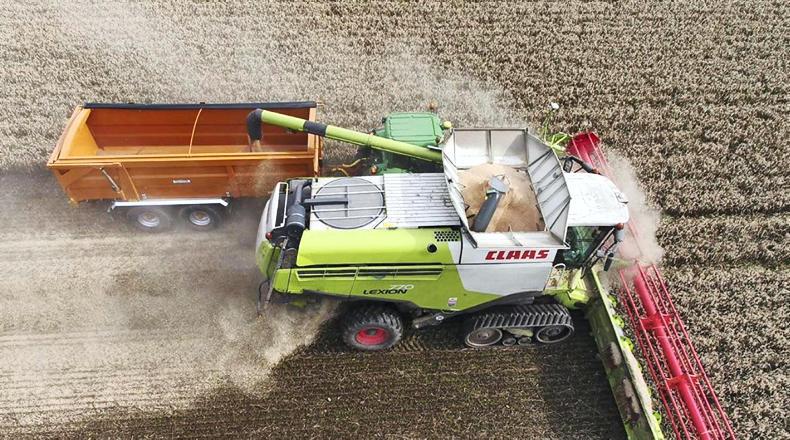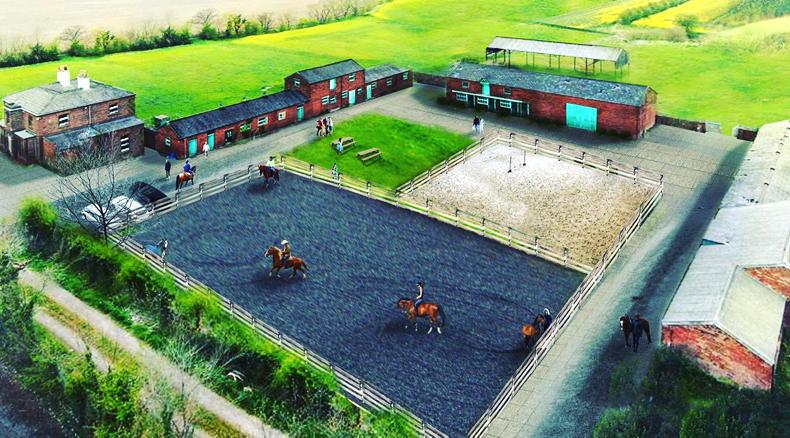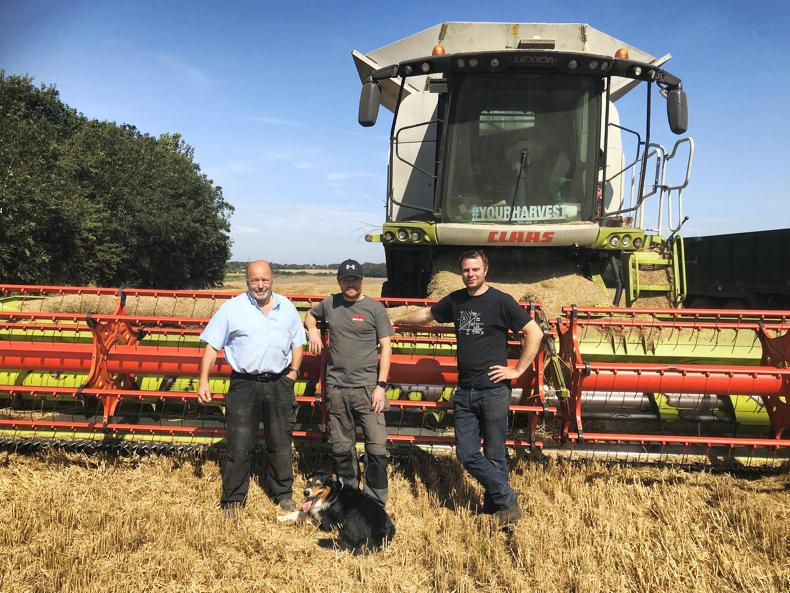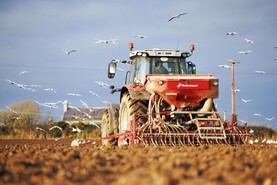My name is Olly Harrison and I farm on the oustkirts of Liverpool. Some people might know me on Twitter as @agricontract, where I engage or enrage Chris Packham and George Monbiot.
I farm 1,100ac of combinable crops with 80ac of grass and combine a neighbouring farm’s 800ac on top.
Farming on the edge of the city comes with its challenges. Most gateways are thought of as out-of-hours council tips. Gaps in hedges mean hare coursers are allowed entry after dark, in whatever 4x4 was cheap on Ebay that week.

Olly Harrison farms on the outskirts of Liverpool, England. This is the main farm.
However, farming close to Liverpool does have some advantages, in that there are lots of diversification opportunities. We have some office space that pays better in the stone barns than the cows ever did.
We are not very far from the oilseed rape crush in Liverpool, so we have a 3,500t rape store for Openfield Cooperative and out-loading keeps us busy in the winter.
A big part of the business that has grown over the years is recycling arboreal or tree waste into biomass. Most of the Liverpool suburbs’ tree surgeons bring their waste to us and we chip it into biomass.
It sounds really simple, but running a 600hp wood chipper is like playing Russian roulette. It’s not a question of if something will go through it and smash it up, but when! We’ve had rakes, shovels, axes, sledge hammers, ball hitches – you name it, we’ve found it, with a loud noise and a lot of expense.
Once chipped, we dry it to the correct moisture level on our drying floors, whichwe use in summer for grain.
Drying grain cheap is a big win for us. Putting near 2,000ac through one machine in the damp northwest is a challenge on a good year.
The last 10 months have been ridiculous weather-wise. For every dry day we’ve had four and a half wet ones.
We try to no-till as much as possible. Any ground we managed to get winter corn in that has been in a longer no-till rotation has got some sort of green to it. However, where we levelled ruts on headlands from harvest traffic with a sumo, the land just lay wet and rotted, along with 180ac of winter barley.

A flooded field of wheat, including some resident ducks.
All the wheat after oilseed rape was either rotten or eaten by slugs, as it rained continually for three weeks after it was drilled. That land will now go into spring wheat. The plan was to re-drill with winter wheat up until the end of February, but having had the wettest February for 43 years, spring wheat and barley is the only option.
I think spring wheat with the milling premium will be better than giving barley away at current prices. Thank god for diversification to keep the hire purchase and overdraft happy.
Since September, we have taken on another two diversification projects. One is a private dog walking field that will be rented by the hour to people who don’t want to walk their beloveds with the waifs and strays in the local park.

A view from above from the last harvest.
Student accomodation
The other is my biggest diversification project to date–converting a farm I managed to buy last year (by blagging to the bank manager that it was too cheap not to buy) into student accommodation with room for your horse.
There are 70,000 university students in Liverpool each year, so I’m turning the farmhouse into seven apartments. I’ve already got some stables there, so with a manege and a few acres of turn-out, I hope it could be the start of something bigger.

An artist's impression of Olly Harrison's planned student and equestrian accommodation.
I would like to build it up to around 40 students. The university is 20 minutes away. Horses need to be fed seven days a week, but students only attend college four to five days a week, so for some it makes sense to live near their horse, not their uni.
My place will save students livery money and I get a good return on my empty farmhouse and some acres of grass.
If you found my ramblings interesting, follow me on Twitter for more northwest UK farming updates. And don’t forget tell 50,000 of your closest friends about the equestrian accommodation near Liverpool university!
My name is Olly Harrison and I farm on the oustkirts of Liverpool. Some people might know me on Twitter as @agricontract, where I engage or enrage Chris Packham and George Monbiot.
I farm 1,100ac of combinable crops with 80ac of grass and combine a neighbouring farm’s 800ac on top.
Farming on the edge of the city comes with its challenges. Most gateways are thought of as out-of-hours council tips. Gaps in hedges mean hare coursers are allowed entry after dark, in whatever 4x4 was cheap on Ebay that week.

Olly Harrison farms on the outskirts of Liverpool, England. This is the main farm.
However, farming close to Liverpool does have some advantages, in that there are lots of diversification opportunities. We have some office space that pays better in the stone barns than the cows ever did.
We are not very far from the oilseed rape crush in Liverpool, so we have a 3,500t rape store for Openfield Cooperative and out-loading keeps us busy in the winter.
A big part of the business that has grown over the years is recycling arboreal or tree waste into biomass. Most of the Liverpool suburbs’ tree surgeons bring their waste to us and we chip it into biomass.
It sounds really simple, but running a 600hp wood chipper is like playing Russian roulette. It’s not a question of if something will go through it and smash it up, but when! We’ve had rakes, shovels, axes, sledge hammers, ball hitches – you name it, we’ve found it, with a loud noise and a lot of expense.
Once chipped, we dry it to the correct moisture level on our drying floors, whichwe use in summer for grain.
Drying grain cheap is a big win for us. Putting near 2,000ac through one machine in the damp northwest is a challenge on a good year.
The last 10 months have been ridiculous weather-wise. For every dry day we’ve had four and a half wet ones.
We try to no-till as much as possible. Any ground we managed to get winter corn in that has been in a longer no-till rotation has got some sort of green to it. However, where we levelled ruts on headlands from harvest traffic with a sumo, the land just lay wet and rotted, along with 180ac of winter barley.

A flooded field of wheat, including some resident ducks.
All the wheat after oilseed rape was either rotten or eaten by slugs, as it rained continually for three weeks after it was drilled. That land will now go into spring wheat. The plan was to re-drill with winter wheat up until the end of February, but having had the wettest February for 43 years, spring wheat and barley is the only option.
I think spring wheat with the milling premium will be better than giving barley away at current prices. Thank god for diversification to keep the hire purchase and overdraft happy.
Since September, we have taken on another two diversification projects. One is a private dog walking field that will be rented by the hour to people who don’t want to walk their beloveds with the waifs and strays in the local park.

A view from above from the last harvest.
Student accomodation
The other is my biggest diversification project to date–converting a farm I managed to buy last year (by blagging to the bank manager that it was too cheap not to buy) into student accommodation with room for your horse.
There are 70,000 university students in Liverpool each year, so I’m turning the farmhouse into seven apartments. I’ve already got some stables there, so with a manege and a few acres of turn-out, I hope it could be the start of something bigger.

An artist's impression of Olly Harrison's planned student and equestrian accommodation.
I would like to build it up to around 40 students. The university is 20 minutes away. Horses need to be fed seven days a week, but students only attend college four to five days a week, so for some it makes sense to live near their horse, not their uni.
My place will save students livery money and I get a good return on my empty farmhouse and some acres of grass.
If you found my ramblings interesting, follow me on Twitter for more northwest UK farming updates. And don’t forget tell 50,000 of your closest friends about the equestrian accommodation near Liverpool university!










 This is a subscriber-only article
This is a subscriber-only article










SHARING OPTIONS: